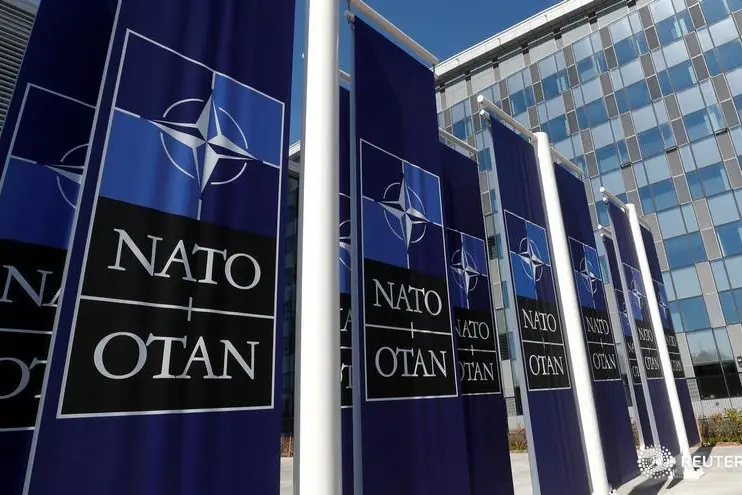PHOTO
This week, the 30 foreign ministers of the North Atlantic Treaty Organization met in Riga, Latvia. The timing of the meeting could not have been better.
The top item on the agenda was the situation in Ukraine and Russia’s actions toward that country in recent weeks. Another focus was on analyzing the mistakes made during NATO’s withdrawal from Afghanistan during the summer and the lessons that can be learned from it.
However, one agenda item that has not received much coverage in the media was the launch of the formal process to rewrite NATO’s next Strategic Concept.
According to Secretary General Jens Stoltenberg, one of the goals of the new Strategic Concept will be for the alliance to adopt “a global outlook.” While many policymakers in the Arab world might think of NATO primarily in European terms, they should be watching the outcome of this process to see whether the Middle East gets the attention it deserves.
The Strategic Concept is the main strategy document that guides the future policies of the alliance. After the 1949 North Atlantic Treaty that established NATO, the Strategic Concept is probably one of its most important documents.
The last time the organization published a new Strategic Concept was more than a decade ago, in 2010. In 2021, the world looks drastically different.
In addition, the previous Strategic Concept was published before the events of the Arab Spring and its aftermath. Eleven years ago, nobody could have guessed that NATO would lead a military intervention in Libya; Syria would descend into a civil war that would spawn one of the deadliest terrorist organizations in the world; or that NATO would lose the battle in Afghanistan.
In the 40-page 2011 Strategic Concept, the words “China,” “pandemic” and “Middle East” cannot be found. In retrospect, it is clear that the document had a shelf life of about a year. The alliance is in desperate need of a replacement.
There are many issues that NATO will want to address in its next Strategic Concept. In particular, it cannot ignore the Middle East and North Africa. Members of the alliance share many of the same security concerns as the countries in the MENA region, whether it is regional terrorism emanating from extremist groups or the threat of nuclear proliferation in Iran.
It must be stated very clearly that NATO’s engagement in the region should be focused on building and enhancing partnerships, not military interventions.
Thankfully, if the organization wants to improve its relationships in the MENA region it has a strong foundation on which to build. For example, many MENA countries have demonstrated a willingness to cooperate with the alliance and have even contributed troops to NATO-led missions. Great examples of this include the Emirati, Egyptian, Bahraini and Jordanian participation in Afghanistan, and the Emirati and Moroccan soldiers who contributed to NATO-led missions in the Balkans.
Furthermore, there have been three NATO military operations in the MENA region in recent years. These included training missions in Iraq, efforts to counter piracy off the Horn of Africa, and the NATO-enforced no-fly zone over Libya in 2011.
In addition to this close military-to-military cooperation, NATO also has structures already in place to improve wider cooperation with its partners in this part of the world but has done little to enhance these relationships in recent years.
It carries out its cooperative security task with its southern partners through two mechanisms: The Mediterranean Dialogue and the Istanbul Cooperation Initiative.
The former, launched in 1994, forms the basis of NATO’s relations with its Mediterranean partners: Algeria, Egypt, Israel, Jordan, Mauritania, Morocco and Tunisia. Although talks generally take place on a bilateral basis, between NATO and a single Mediterranean partner (NATO+1), on occasion the forum meets as NATO+7, placing Israel at the same table as some of its regional neighbors, where it would otherwise not be.
The Istanbul Cooperation Initiative, which was launched in 2004, is currently the basis of NATO’s relations with the Gulf states. Although all six members of the Gulf Cooperation Council were invited to join, so far only Bahrain, Kuwait, Qatar and the UAE have become participants.
It is time for NATO to build on its existing diplomatic and military relationships with partners in the MENA region. The alliance needs to use its next Strategic Concept to chart a path that turns programs such as the Mediterranean Dialogue and the Istanbul Cooperation Initiative into meaningful platforms to mutually advance regional security interests. For too long, both groupings have been relegated to the status of talking shops. This needs to change.
Yes, NATO’s main focus must remain Russia. But it cannot ignore its neighbors to the south. With the success of the Abraham Accords, coupled with the unifying effect that Iranian aggression has had across the Middle East, there is no better time for NATO to work more closely with partners in the region.
- Luke Coffey is director of the Douglas and Sarah Allison Center for Foreign Policy at the Heritage Foundation. Twitter: @LukeDCoffey
Copyright: Arab News © 2021 All rights reserved. Provided by SyndiGate Media Inc. (Syndigate.info).





















